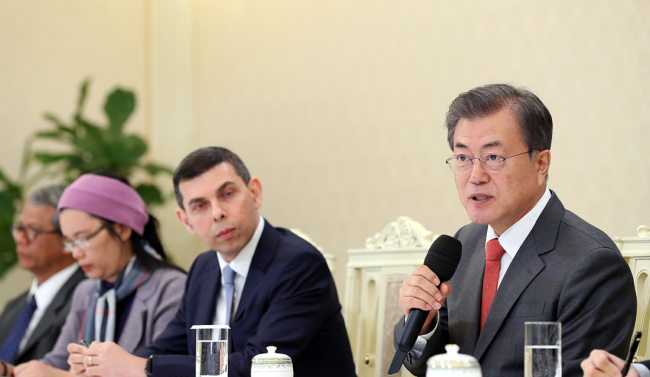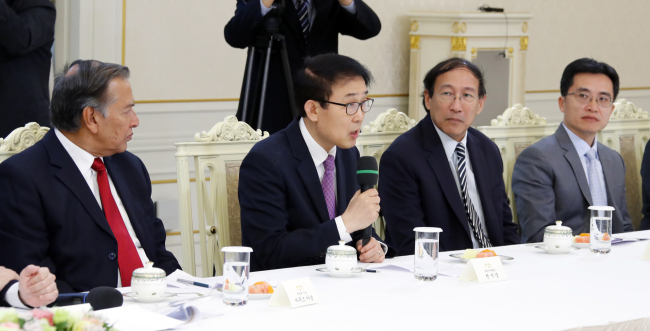Inviting NK leader to Korea-ASEAN summit remains open
By Choi He-sukPublished : April 25, 2019 - 18:19
Inviting North Korean leader Kim Jong-un to the South Korea-ASEAN summit remains an open question, South Korean President Moon Jae-in said Thursday.
Speaking at a meeting with senior leaders of the Asia News Network -- a coalition of 24 news organizations from across Asia -- in Seoul, Moon said the matter is outside of South Korea’s control, and that all the Association of Southeast Asian Nations members would need to agree.
Speaking at a meeting with senior leaders of the Asia News Network -- a coalition of 24 news organizations from across Asia -- in Seoul, Moon said the matter is outside of South Korea’s control, and that all the Association of Southeast Asian Nations members would need to agree.

South Korea is scheduled to host a summit conference with ASEAN nations’ leaders in November, and the idea of inviting Kim was first raised by Indonesian President Joko Widodo.
“Of course, such a meeting is not within (our) complete control,” Moon was quoted as saying by Cheong Wa Dae spokesperson Ko Min-jung.
According to Ko, the president also expressed hopes for further US-North Korea dialogue, as well as the willingness to mediate between the two.
“President Trump and Chairman Kim Jong-un both expressed commitment to continue dialogue. (I) hope the third North-US summit is held soon,” Moon said.
“(I) will meet Chairman Kim as early as possible, and will facilitate a North-US dialogue.”
The second US-North Korea summit in February ended without an agreement, and Moon has since called for a fourth inter-Korean summit to be arranged. According to reports, Moon has a message from Trump to Kim, which he will deliver at his next meeting with the North Korean leader.

At the meeting, Moon also emphasized the administration’s foreign policy initiatives.
“As you may be aware, my government has two major differences with regards to past administrations,” Moon said, going on to cite efforts to engage North Korea and facilitating talks between the US and Pyongyang, as well as his foreign policy initiatives.
“Regarding the Korean Peninsula issue, we have been striving to improve both inter-Korean and US-North Korea relations, and we have been undertaking these efforts through diplomacy and dialogue,” he said.
“And the second element is that we are also striving through our New Southern Policy and also New Northern Policy to significantly increase and elevate our diplomacy as well as trade relations with countries in Asia.”
The New Southern Policy is one of the Moon administration’s main foreign policy initiatives. It aims to dramatically strengthen South Korea’s political and economic ties with the ASEAN bloc and others in Southeast and South Asia. The New Northern Policy is aimed at achieving similar goals in relations with countries to the north and northwest of the peninsula.
At the meeting with Moon, Chon Shi-yong, editorial director of The Korea Herald and ANN chairman, conveyed the ANN member organizations’ hopes for establishing peace on the peninsula and their hopes to aid the New Southern Policy. The ANN counts among its members news organizations from all 10 ASEAN countries and India -- the focus of the New Southern Policy.
In addition to Chon, the meeting was attended by 19 ANN representatives from 14 member news organizations, as well as those from the ANN secretariat.
Pana Janviroj, ANN executive director, highlighted the potential of linking the New Southern Policy with Seoul’s efforts to engage North Korea, suggesting the possibility of recognizing North Korea as a dialogue partner of ASEAN.
Warren Fernandez, editor-in-chief of Singapore’s the Straits Times, touched on Seoul’s role in US-North Korea denuclearization talks, saying the South could mediate between the two sides to narrow their differences.
By Choi He-suk (cheesuk@heraldcorp.com)







![[Graphic News] More Koreans say they plan long-distance trips this year](http://res.heraldm.com/phpwas/restmb_idxmake.php?idx=644&simg=/content/image/2024/04/17/20240417050828_0.gif&u=)
![[KH Explains] Hyundai's full hybrid edge to pay off amid slow transition to pure EVs](http://res.heraldm.com/phpwas/restmb_idxmake.php?idx=644&simg=/content/image/2024/04/18/20240418050645_0.jpg&u=20240419100350)






![[From the Scene] Monks, Buddhists hail return of remains of Buddhas](http://res.heraldm.com/phpwas/restmb_idxmake.php?idx=652&simg=/content/image/2024/04/19/20240419050617_0.jpg&u=20240419175937)

![[KH Explains] Hyundai's full hybrid edge to pay off amid slow transition to pure EVs](http://res.heraldm.com/phpwas/restmb_idxmake.php?idx=652&simg=/content/image/2024/04/18/20240418050645_0.jpg&u=20240419100350)

![[Today’s K-pop] Illit drops debut single remix](http://res.heraldm.com/phpwas/restmb_idxmake.php?idx=642&simg=/content/image/2024/04/19/20240419050612_0.jpg&u=)